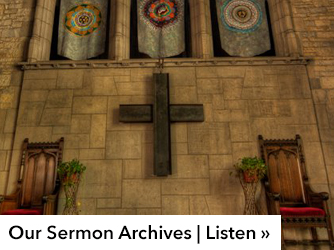(pic copyright: Neighborhood Initiative)
Mary Stainton preached this past Sunday. (This previous sentence truly represents the poverty of the English language; she did far more than preach. Audio will be on the website soon). Her scripture, Psalm 23 reflected on the shadow of death…and what it means to be cast under this shadow as a person living with a physical disability…and God’s gentle but constant reminder to us all that death does not have the final word.
Let that speak to your situation. Death does not have the final word.
And yet, death is real. People do truly leave us. Friendships end. Opportunities fail. Even selves within us (!) stop being helpful to our growth. And there is life after these things, of course: people become ancestors, relationships give us lasting wisdom, and maybe that thing wasn’t supposed to work anyway. Resurrection is always present – thank God – but the losses are real, and knowing that a moment will probably end should not be addressed as a curse but an opportunity to experience the thing/person/situation more fully.
I’m talking about life now. I’m talking about time. That’s what we have along with these frail bodies and minds…time. This Lent, we as a church have decided to care for ourselves by paying more attention to how we spend our time, and to make time for God and the care of your spirit, knowing that this world and your busyness will not give you this time.
Christianity-via-Greece-via-Africa has two concepts of time…there’s chronos, which means chronological time – actual seconds/minutes/hours – and there’s kairos, which means opportune time – the right time – or to paraphrase Dr. Richard Swenson: kairos is significant or meaningful time. The challenge for each of us is that we spend most of our lives bound in chronos with rare brushes against kairos, where this breath in our life can be spent on meaningful questions lying deep within us instead of on our phones, or responding to something, or playing catch up…or reading emails (oops).
Swenson offers a good reason for this – the sundial and electricity (which cut our days into small pieces, and then ruined day and night completely, respectively) – and in many ways we’ve become slaves to chromos time: dodies always in motion, often doing things that serve others but not our sense of significance in the world.
Don’t be sad: this is literally the social engineering of our times…productivity over purpose.
But then something strange happens…for Kara Swisher (of the NY Times), it was a stroke that made her value her time more…for Tim Chen (of NerdWallet), it was losing his job during the recession that made him value his gifts more…for some of us it is losing abilities we once had, or someone we loved deeply. Something happens that does more than make us angry or sad – it puts our mortality before us, to remind us that time is not unlimited and that kairos is far more important than chronos. In fact, our sense of kairos should be determining how we spend our chronos.
This means we need to tend to our kairos better. To ask, “What is significant to me?” I mean, really: to take some time and maybe even write down what matters to you in this life, and then in the next column write how your current life reflects that (and if it doesn’t, don’t be afraid to write “Not yet” and get on it!); to look at our time spent and ask how much is spent in meaningful, significant, (some might even say “purpose-driven”) activity and reflection.
Freeing time/Saying NO doesn’t mean it’s not meaning-full: it just has less meaning than something else God needs you working on right now. If folks can’t respect that, as Jesus says in Matthew 10, “Shake the dust off your feet”, and keep it moving.
This also doesn’t mean no meetings, or no exploring things that you aren’t currently interested in. It means that we begin to build an internal scale to weigh when something clearly (and literally) meaning-less or life draining has more energy than it should.
And some of us have life situations where, “Hey, I don’t love this job but I need this job and it takes a ton of my time. What does all this mean for me?” Do what you need to do, and remember: to free any amount of time to commune with the Holy Spirit inside of you is a move toward liberation. Try to make more out of whatever you have, feel no shame, and discover your kairos this season. This is what Lent is about.
PRAYER:
God, help me discover kairos time in my life, and to recover the significance that is often lost in my busyness. Help me to use my minutes and days toward finding and fulfilling your purpose for me. I am listening, ready, and capable of this challenge. Amen.
QUOTE:
“May your choices reflect your hopes, not your fears.” –Nelson Mandela


